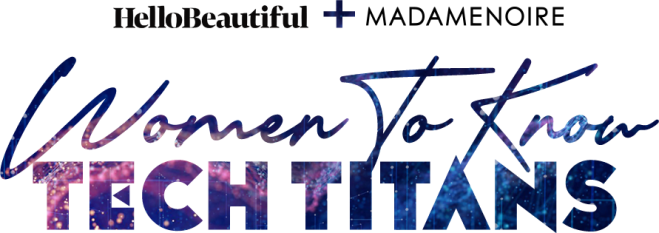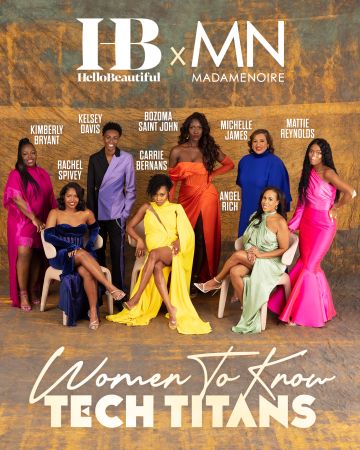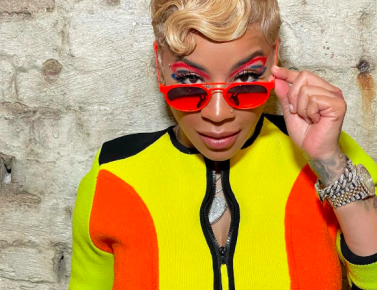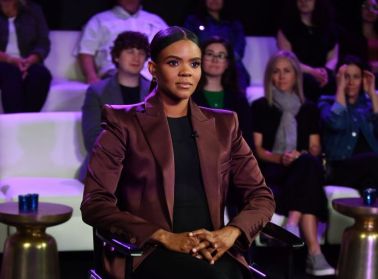

Our Women To Know: Tech Titans cover celebrates Black women in tech making a difference in their communities and across industries.
Rooted in the idea that Black women are found at the cornerstone of innovation in countless industries, Women to Know strives to celebrate these often overlooked change agents who blaze trails for other women to leap onto.

Bozoma “Boz” Saint John’s remarkable rise in the tech world is an example of the extensive reach her influence has had throughout her exemplary career.
Bozoma shook the table when she became the first Black woman to oversee global marketing for Apple in 2014. But it wasn’t until the 46-year-old marketing powerhouse’s impressive and humanistic response to an Uber driver’s story that caught the attention of Arianna Huffington, a prominent board member of the mega rideshare company. That act of kindness catapulted her career to the next level when she became the first Black woman to be hired as the Chief Brand Officer at Uber in 2017.
In 2017, Billboard and Black Enterprise deemed the marketing whiz as one of the “Power 100” list and “Most Powerful Women in Business.”
She would go on to streaming giant Netflix after leaving her Chief Marketing Officer position at Endeavor. The marketing savant left Netflix in March 2022.
Dancing to the beat of her own drum, Bozoma said about her departure, “If you’re doing something you love, fantastic, keep doing that, but there are other things that I want to accomplish. You’ve got to know when the time is up and to keep it moving.”
“I came to Netflix with a surplus of enthusiasm and creative energy and am immensely proud of the campaigns we inspired that sparked global conversations. It’s been a transformative two-year experience for which I will always be grateful,” she concluded.
The fashion-forward “Marketing Hall of Famer, entrepreneur and author of The Urgent Life recently sat with MADAMENOIRE to discuss her latest endeavor and what drives her.
Released in February, the memoir is Bozoma’s poignant reminder that the pandemic pushed the boundaries of the human spirit with respect to mental health, “loss and trauma.”
When asked why the book was important, the mother of one said, “I decided to write The Urgent Life now because there’s so much talk about mental health, especially around loss and trauma and the things we’re all going through so quietly and secretly behind closed doors.”
“And in the last three years of the global pandemic,” she continued. “We still find it taboo to talk about our trauma in public.”
Bozoma’s own grief served as the catalyst for her text. After the 2013 death of her beloved husband, Peter Saint John, to an aggressive form of cancer, the executive was determined to not suffer the devastating loss in silence.
Further expounding on the inspiration behind the thoughtful book, Bozoma had the foresight to see beyond the initial stages of loss and grief. She proactively opened up about the aftermath of losing a loved one- “the triggers… that could set them off,” and overcoming the pain.
“I think it’s important to not just bring the happy headlines into the work, but the sad truths that connect us as human beings.”
When asked about the biggest takeaway Bozoma wanted readers to take from her storytelling, she said, “In the end, my desire for The Urgent Life is that people realize there’s hope even after you’ve had trauma…even after you’ve suffered loss. And the loss doesn’t have to be of a physical person.”
As not to be interpreted as a sleepy memoir, the former Netflix executive expressed that the book was a “call to action.” Bozoma explained that the book and her life’s purpose is to be empowered to live her absolute best life- now and in the future.
Although the Ghanaian-American author doesn’t diminish her trailblazing progress in business, she is quick to remind Black women that even with her astounding accomplishments, she is much “prouder of what she’s overcome.” And that peace within is irreplaceable when trying to find that soft place to land.
“I don’t look to external ways to give myself peace and joy or love… It’s me. I talk about it in my book.”
The beauty of Bozoma’s life philosophy is that she still has goals, she isn’t consumed with setting “empty” goals for the sake of checking boxes.
The talented woman has committed to embracing happiness, living in the moment and not looking for the next thing to be fulfilled. Although Bozoma’s life has been filled with incredible highs, she did share that being at the top has been incredibly lonely as she didn’t have the community she longed for after she secured the top spots at her former employers.
“The air gets very thin at the top. So the advice I give is to find your circle,” she said. “Rely on them. Tell them the truth. And in that way, you’ll have a corner that you can go to and feel good in.”
Bozoma’s self-recognition and intentional regard for herself in an industry dominated by white men is certainly Hall of Fame worthy. And if this is the standard for Black women to live by professionally and privately- may every sister have her tenacity, charisma, ambition and candor.
FOLLOW BOZOMA SAINT JOHN ON SOCIAL

Instagram is the perfect place for a rebrand, and nobody is better at transforming their professional image than Michelle James.
“I’ve reinvented myself several times in my career,” she told HelloBeautiful.
James reintroduced herself as a technology marketer when she accepted the role of Director of Culture & Community Marketing at Instagram in 2020.
“I never sought out to get into tech. I’m a marketer first. I spent my career across entertainment, print, TV,” she added later.
Crossing into the audio space piqued her curiosity about the potential of technology. James launched the Cocktails & Cancer podcast with her friend Danielle Brown while undergoing chemotherapy was her first stab at reinvention.
After their podcast was sponsored by Google, she joined the advisory committee of their podcast creator program, sparking her interest in the potential of the technology industry. “From there, just really kind of fell in love with, kind of the multi-dimensions of tech,” she added.
The move was unexpected. While college grads were scouring social media for tips on how to get a job at Meta, James was already excelling in marketing. The opportunity to help Instagram reach new audiences in meaningful ways was tough for her to pass up.
“I thought, you know what? I can kind of take all of the things that I’ve done in culture across these various industries and really make a big impact.”
She started internally by building the most diverse marketing team in the firm. “Every voice should be heard,” she said. “As I was building my team, I made sure that it was reflective of the community that we were serving.”
Making impacts on both sides of the app was rewarding, but it came with challenges. Joining a new industry meant learning new lingo and new methods of communicating her value. “I’m considered a non-traditional profile. I’m not an engineer. I didn’t grow up in tech. I don’t code,” she explained. She worked on translating what she and her team were accomplishing in a language “traditional tech counterparts can understand.”
James acknowledged how being “bold” and “proud” as a Black woman can affect communication in the workplace. “You use your head. You use your hands, you know? It can be intimidating to some,” she said. “There’s so many stereotypes. You know? We’re angry, we’re aggressive.”
She refused to let concerns about perception shake her self-confidence.
“I’m confident. I’m secure. I’m intelligent. I know what I’m talking about. I’m contributing to the environment,” she said. Those contributions included executing successful campaigns aimed at inclusion and representing the brand at high-profile cultural events like Art Basel.
She confronted assumptions by “having an informed POV.” She was armed with faith and facts when she showed up to a meeting. If there was going to be a narrative about her performance, she would own it.
“I was just self-aware of how I was impacting and how I was showing up in my environment,” James continued. She recommends other would-be tech professionals clutch that self-awareness and use it to propel their own careers.
“Oftentimes young people come to me, and they say, ‘Hey, you know, I’m looking for my next role. I’m trying to pivot outta here. And I say, what do you wanna do? And it’s just like, blank,” she said.
James might not have had Meta on her professional mood board but she knew she wanted to tell stories through marketing. That clarity left her open to taking the opportunity when it arrived. She advises others to think of what they want to accomplish before moving forward.
“I always had vision for myself. And it’s interesting cuz we’ll have vision for the brands we work on. We’ll have vision for our friends, we’ll have vision for our siblings, but oftentimes we lack vision for ourself,” she said.
“It is critical as you navigate your career that you know who you are.”
FOLLOW MICHELLE JAMES ON SOCIAL

Mother. Innovator. CEO. Venture Capitalist. Pioneer.
Those are just a few of the words one would use to introduce Kimberly Bryant. But they hardly speak to the whole of who she is and what she’s done. She is the founder of not one but *three* tech startups aimed at advancing the lives and careers of Black girls and women in tech. As the creator and founder of the revolutionary and immensely successful Black Girls Code, she has reached more than 30,000 Black girls across the world, stretching from the Bay Area all the way across the globe to Johannesburg, South Africa. Ms. Bryant is also the CEO and Founder of Ascend Ventures Tech and The Black Innovation LABS – created to help marginalized founders working in climate sustainability, agtech, and femtech build inroads and pathways to ownership. But one cannot give her flowers without acknowledging that she started, came up as, and is still one of the few Black women in a very white, male-dominated space.
Bryant got her start in tech in the early eighties. When many of us were just being introduced to things like Commodore 64, “logo” coding, and turtle graphics, Kimberly Bryant was learning the world wide web – something the rest of us wouldn’t see until the mid to late nineties. She had gotten her degree in electrical engineering and computer programming and wasn’t necessarily interested in tech, but when she got to the Bay Area and saw what was happening in tech, she dove in, head first. “I wanted to try to test those waters and create a way for other women like me to also have an opportunity to participate as well.”
And created a way she has – well, more like blazed a trail. Here is just a glimpse of what Ms. Bryant has accomplished in her field: Creator/Founder of Black Girls Code, CEO/Founder of Ascend Ventures Tech, Founder/CEO of The Black Innovation LABS, Investor, Venture Capitalist, TED Speaker, Smithsonian Ingenuity Awardee, named a White House Champion of Change by our forever POTUS, President Barak Obama, awarded the Jefferson Award for Community Service in honor of her work to support communities n the Bay Area, listed as one of the 25 most influential African-Americans in Tech by Business Insider, was hailed by Fast Company as one of the “Most Creative People” and was on both The Root’s and Ebony’s Power 100 list. WHEW!
And that’s just a small sample of the accolades.
Ms. Bryant’s journey did not come without pushback, questioning, and at times disrespect. “When it is a woman, and especially a woman of color from a marginalized community, all of your flaws become fatal. And we don’t get that Linnaeus, or grace if you will, to move and develop and grow in our leadership journey.” She recalls that early in her career she was often in positions of leadership, or held authority over men, and was met with disrespect, or treated as though she was not on equal footing with her male counterparts. That would have been enough for most of us to do an immediate about-face, but as Ms. Bryant recalls, it was her mentors then and her mentors now that kept and keep her going. That, and having a soft place to land – motherhood.
“My soft place to land is always centered on my role as a mother to my daughter. I have one daughter and leaning into what she needs on a daily basis, even as she is an adult, has been centering for me. I think of that, even in the realm of my journey and how I move in life. I always want to move in a way that makes her proud. So, really reflecting on the fact that this little girl was looking at me, and I am probably one of her most important role models… it keeps me centered. It also helps me look deeper within and really evaluate how I want to show up in the world and in life. I want to be someone that she is proud of as a young woman. Knowing that this little girl has me as her keeper, as her protector, is what allows me to embrace that softness, but with the fierceness that comes with being a mama bear.”
FOLLOW KIMBERLY BRYANT ON SOCIAL

Kelsey Davis noticed something missing from the chic glass conference rooms and elegant client dinners after working with some of the world’s top companies.
“There wasn’t an easy way for creators into brands to connect,” the Atlanta native told HelloBeautiful.
Davis balanced her duties as a college sophomore at Syracuse University with a bustling “career in creative production.” Being an independent creator gave the public communications major a perspective her peers and the people cutting her checks lacked.
“I was traveling across the world producing visual content for global consumer brands like Coca-Cola, Land Rover, Puma, Conde Nast, and at the time, I just had a lot of issues trying to manage being my own creative, managing other creatives [and] connecting with brands,” she continued.
Davis applied the knowledge she was acquiring in the classroom to building something that could improve the experiences of other freelancers.
CLLCTVE, a portfolio platform designed to connect brands and creators, was born of her frustrations in 2019.
Over $5 trillion flowed through the tech industry in 2022, according to Zippia, but marginalized creators can have trouble generating their fair share of that revenue. Even the top mainstream creators can struggle with selling themselves to executives. CLLCTVE helps to demystify monetization so creators can spend more time creating.
“While I was in college, I actually started learning about computer science,” she said. “I started realizing that technology actually could be a huge tool that bridges that gap, and so that’s when I started learning about products.”
Davis used “technology,” “innovation,” and “entrepreneurship” to go from dreamer to problem-solver without abandoning her education. She graduated with a Master of Science in Entrepreneurship and Emerging Enterprises in 2020. She is currently furthering CLLCTVE’s agenda from her adopted home of Greenwood, Oklahoma, the original Black Wall Street.
“We’re a portfolio platform that connects creators to paid opportunities. And so we’re the fastest, easiest way to make a portfolio online. You’re able to take all of your creative content and data that’s living on all these different platforms, streamline that into one place, and then we’re able to use that data to easily match you and recommend you to different brands that you could be working for,” explained Davis.
CLLCTVE users don’t have to be located in a major city or connected to an ad industry veteran to take advantage of the platform. “We know that opportunity isn’t everywhere, even though talent is,” declared Davis.
She expressed confidence in technology’s ability to facilitate the missed connections she observed as a novice creator. “I believe that technology can solve for that,” she said. Davis thinks Black founders are uniquely positioned to solve challenges through ingenuity because of the obstacles they face.
“I truly do believe that Black founders, Black people can probably solve 99% of the world’s problems because of the level of connectivity that we have to them,” she said.
She sees her own marginalized identities as assets. “It’s super important for me, even through dealing with these challenges, to make sure that I’m protecting my creativity while fully maintaining the wholeness of the identities that I have,” said Davis.
“God made me to be me,” she added.
Davis embraces “Blackness,” “queerness,” “being Gen Z,” and “being a female” on her professional journey despite the tech industry being “dominated primarily by white, older male straight men.”
She considers her creative potential to be at full force when she can “fully identify with all of who I am.”
Davis finds value in her upbringing as well. “God’s blessed me to be in incredible spaces and environments, but more than anything, the first person that I looked up to is my mother,” she said. She uses the life skills she acquired growing up in the boardroom. “My mom is my original Titan. She’s really just taught me how to navigate life, how to survive, but also how to heal, and how to prioritize.”
She doesn’t have to research the culture because she remains connected to it. “I’m able to actually take that proximity, to the streets, to culture, to community, I’m actually able to use that likeness to bring my vision to the world.”
Learn more about CLLCTVE here.
FOLLOW KELSEY DAVIS ON SOCIAL

Rachel Spivey set her sights on joining Google as a student at Hampton University. “Google came to campus my senior year. I was so excited. I’d heard so many great things about the company and really wanted to work for them,” she told HelloBeautiful.
Timing pressed pause on her plans of becoming a Googler. “Unfortunately, this was during the ’08, ’09 crash, and they went on a hiring freeze.” Even maintaining an A+ GPA and having stellar references didn’t change the landscape.
She maintained relationships with her contacts at the company, and after nine months of working at another firm, she was given a chance to come back and interview again. This time she made it. “I’ve always felt really connected to Google’s mission, and I’m glad that I landed back there.”
Spivey was unaware of what it would take to succeed at the global tech giant. “When I first landed on Google’s campus in Mountain View, California, I didn’t even know what to expect,” she said. The learning curve was steep. “I realized I didn’t understand the performance system and how to get ahead at Google.”
She turned to senior people in the company for advice. “I had mentors that have helped me through the ropes,” she said.
“I have been fortunate in the more recent years to have a great mentor in Melanie Parker. She is the Chief Diversity Officer at Google. I get to see how she navigates the workplace, both personally and professionally, and particularly as a black woman. She’s someone that I’ve been able to observe and learn from, and I’m super grateful for her leadership.”
Studying the dynamics of different departments and cycles throughout the organization helped her gain an advantage.
“It took me five years to be able to really gain my footing at Google and to get my stride. But one thing that really helped me was learning patterns and helping to navigate and be proactive and getting ahead of them.”
Spivey turned the advice from her mentors into a flourishing career at the firm. More than a decade later, she is ensuring other people prosper at the company as director of their Stay and Thrive team. “I’ve been in the game for 13 years,” she said.
Diversity, equity, inclusion, and belonging efforts have expanded into retention across the technology industry. Spivey is one of the professionals working to help candidates succeed, the way her mentors helped her. “That is what makes me proud every day to wake up, to go to work, knowing that I’m serving my purpose and helping so many other people through their careers,” she said.
Spivey felt like she matured not only as a professional but as a person while climbing the ladder. “Growing up at Google meant that I’ve gone through bad breakups, I’ve lost my mom, I’ve gone through depression. All of those things happened while I was at work, and I was still able to make it through,” said Spivey.
Teamwork helped her navigate through struggles. “I lead an amazing team of individuals. They look after me. They care for me. They cheer for me. They help make sure the work gets done.” She turned to people outside of the company as well. “I have an amazing group of friends and colleagues that I’ve cultivated over the years who I can go to, to cry, laugh, vent, be frustrated, strategize, and I’m really grateful for them,” she said.
Spivey recommends that other young professionals pursue careers in the technology industry, even if they don’t see the representation. “If this is a pathway that you see for yourself, go for it. Go all the way and lean into your convictions and your purpose,” she said.
“As someone who started at Google and didn’t see many people who look like them at the company at that time, you can do it. You can push through.”
FOLLOW RACHEL SPIVEY JOHN ON SOCIAL

When CreditStacker hit the app stores in 2013, it generated over 200,000 downloads within two weeks. As a result, the first literary gamification app was created, and currently serving as the only mobile game in the credit tech industry, CreditStacker has been named the best financial literacy product in the world by The White House, Department of Education.
Meet Angel Rich, the founder and CEO of The Wealth Factory, who through her company, created applications such as WealthyLife and CreditStacker— designed as a suitable provider of equitable access to financial literacy across the world.
The Wealth Factory is a fintech company that designs educational applications, to enhance literacy and workforce development. Launched in 2013, TWF was created by Rich and co-founder Courtney Keen.
The mission started when she was 6, Rich says — of her vision to “create a company geared toward financial literacy for youth.” A Washington D.C. native, Rich began creating The Wealth Factory while a senior at Hampton University in 2008.
The same year, Rich won the Goldman Sachs Stock Portfolio competition, which Rich’s team secured with an algorithm she developed, resulting in a 2% net portfolio gain from the market tanking earlier that year. Rich figured if a product she developed could benefit a failing market, then surely there was a way people could live out their financial lives without the risk of losing their money.
After graduating from Hampton University, Rich found herself with The Wealth Factory as a side hustle, but the overgrown passion to make it a full-time reality.
“Anyone who has a dime in their pocket should also have the financial literacy to go along with it.”
Postgraduate Rich took a job as a Global Market Research Analyst at Prudential, where she received many accolades such as her results being featured in Obama’s Veterans Initiative Research study in the State of Union address. While her career proved to hit the mark, Rich was looking to exit Corporate America. During a 2012 mission trip in Kenya, Rich was inspired to take the leap.
“While on the trip I met a little boy whose only piece of clothing was a t-shirt from the University of Pennsylvania Wharton Business School, while he was drinking from a dirty stream.”
“The experience rocked me; I realized no matter how smart he became, he’d never really have the opportunity to attend that school.”
It was here she realized how urban communities were disproportionately impacted by a lack of financial literacy and support. However, Rich was determined not to allow a child’s origins to limit their financial future. To further speak to this need, Rich decided to dedicate her full self to The Wealth Factory and developed gaming as a worldwide concept to appeal to, advance, and educate youth with apps like CreditStacker.
In addition to CreditStacker, Rich also founded and created Black Tech Matters in 2016 — a social impact organization currently serving over 60,000 Black techies, that aims to “expand diversity in STEM and tech equity in employment, education, and entrepreneurship.” Rich is the author of two books, History of The Black Dollar (2017) and Wealthy Life (2020).
Rich also recently made history in 2020 when she created CreditRich, an app that helps increase your credit score by using your spare change to intelligently pay your bills. The launching of the artificial intelligence app in partnership with credit report agency Experian made her the first Black woman to secure an institutional partnership with one of the three major credit bureaus.
“Being a Black woman in tech, being the first Black woman in fintech, and being called the next Steve Jobs, while all illustrious titles— all come with immense amount of challenges that deeply surround misogynoir.”
In an industry where Black women are underrepresented and overlooked, and who often experience struggles being one of few Black female founders in America, Rich’s passion for equitable financial access paved the way in the tech industry— making it more possible for the next generation of Black women.
“I think someone looking to get into the tech space, should have the audacity to dream ridiculously. They have to remove any barriers that have been placed by society. And they have to allow themselves to believe that they can jump out the window and create the parachute on the way down.”
FOLLOW ANGEL RICH ON SOCIAL

Mattie Reynolds saw the line between tech firm and television studio shrinking and seized the chance to carve out a space for herself. “I was inspired to get into the tech space because, at the time, I was working in the intersection of technology and entertainment,” Reynolds told HelloBeautiful.
She joined Roku in January of 2022 after stints at Hulu and Discovery after making efforts to “upskill” along the way so she could use her understanding of analytics to aid in major app launches.
“I had originally started on the linear side of the business working to hire creatives, and I was tasked with my first opportunity to hire a DevOps engineer,” she continued.
She made room for others by sourcing talent through unconventional methods to make sure that everyone had a chance to join the teams she was building. She didn’t just assume a bro in a hoodie was the best fit for every role. “The personal challenges that I’ve experienced as a black woman in the technology spaces, it starts at the gate,” said Reynolds.
Reynolds was not always comfortable being bold about sticking up for herself and others. “There’s been times that I’ve sat back in meetings, and I haven’t spoken up, or I haven’t been as assertive, or I haven’t said, excuse me, I’m not done talking,” she said. “It did take me some time to get here.”
After building a successful track record that helped her establish what she calls “career currency,” Reynolds found a way to own her talents and champion the talents of others.
She used that currency to challenge the reliance on traditional pipelines.
“Finding talent is hard, but it’s out there, and that’s why we need to challenge these managers because they’ll say, oh, I can’t find a designer, or I can’t find a video editor.”
She helped craft the teams of “product designers and engineers” behind the Discovery Plus and Food Network Kitchen apps. “I have launched three major apps that I’m sure everyone has probably utilized once or twice in their life,” said Reynolds proudly.
Unique perspectives helped those projects be the best they could.
“You gotta put in an effort,” she added. “You literally just have to look for the talent. It’s there.”
Consistently putting in that effort took its toll on her. She was so “consumed” with wanting to create opportunities for people that she failed to give herself enough attention. “It took me some time to find my soft space,” she admitted. “I would take work home with me.”
Reynolds became a homeowner in the pandemic helped her find balance.
“When I turn off that computer, I am in the most comfortable space. I have my plants around me, my two little ones, and I have a prayer room.”
She finds comfort in leaning on her colleagues as well. She went to them with questions and commiserated over issues they were facing in the field.
“I’ve always found a village in the organizations that I’ve worked with,” she said. “When you’re in the technology sector, lean on your ERG [employee resource] groups. Find your village, find your tribe, and build that time that you can have that safe space and candid conversations.”
They shared information about compensation and strategies for moving up the organizational chart. “There’s so much money that’s left on the table when you don’t negotiate your compensation,” said Reynolds.
She recommends professionals research so they can advocate for themselves. “They will try to lie to you and tell you that they don’t have a budget or anything allocated,” she explained.
“they’re trying to throw numbers out there to you. No, you go there, you do your market research, you see what competitors are paying, and you negotiate your compensation, and I guarantee you, if you push back, you make at least 30% more of what you’re currently getting.”
Reynolds recommends that those looking to get into tech “Take the time,” “Invest” and “Go to conferences” so that they can develop contacts outside of their existing network who might be able to lend them support.
“Find your people. Find people that you would list as a role model. Find people that you would list as cross-functional partners because you’re gonna need them.”
FOLLOW MATTIE REYNOLDS ON SOCIAL

She’s been seen in high-profile TV shows such as Netflix’s The Harder They Fall (2021), and the fighting force behind Dora Milaje in Black Panther (2018). She’s a former division 1 athlete, a martial artist, and speaks six languages. She’s been a project manager in China and traveled abroad to London, Paris, and Germany. From acting, filmmaking, philanthropy, stunt woman, and into the tech industry, Carrie Bernans is a woman of many talents and has consistently proved there is no space she can’t enter.
Check all the credentials. Bernans is giving on and off the screen.
Carrie Ann Bernans was born in Richmond, VA, but grew up in Memphis, TN in a single-parent household, which Bernans credits as the reason “she promised always to pay help and kindness forward.”
“I had a teenage mom. I moved around a lot when I was younger and my mom did everything she could to make ends meet, but things were never easy. So, to be where I am now is an accomplishment in itself.”
Bernans’ childhood experiences prepared her for much in the making. In high school, she networked and trained with business investment bankers and accountants. Through her membership in the Youth Business program, Carrie witnessed her mentors do merger & acquisition simulations on Vanderbilt, Emory, and Columbia University campuses. This experience made a significant impact on Carrie’s vision for investments and entrepreneurship.
“Investing in the tech space was something very important to me in an industry mostly dominated by white men. I wanted to come into this space to show that money is power and invest back into my community.”
Carrie has built and developed several tech start-ups. Understanding the difficulty of raising capital for prospective business owners in the Black community, Bernans has raised funds, invested, and served on the board of several companies, aligning with her personal beliefs and passions. Such involvement in the tech industry has landed her features in over 40 publications such as FastCompany, Marvel Universe, and Google on International Women’s Day.
She privately invests and runs three companies: 11 Bernans Productions, Drexel Street Marketing, an organization that helps customers develop and create an online social media presence, and Faith Is My SuperPower, an e-commerce brand designed to band like-minded individuals together.
Not only did Carrie envision a future in finance, but she also wanted to keep on her promise to help others. In October 2020, Bernans launched SheWorks, a venture capital and private equity organization “investing in the future of work, travel, food, retail, media, and education.”
Bernans also recently launched CB Seed, a foundation seeking to “empower the hidden potential within every individual — envisioning a world where all people, regardless of race, social class, incarceration status, or mental well-being are given a fair chance.” Through rehabilitation programs and simulation workshops, CB Seed promotes financial and reading literacy education in an effort to overcome social presumptions.
Bernans is a force that refuses to be unseen. Her consistent presence in multiple spaces undoubtedly pays it forward to the next lineage of women following in her footsteps.
“We want to teach kids the power of money and make it not a foreign language,” says Bernans. “We want to break generational poverty, living check-to-check. We want them to know there’s better options, and that people care.”
In the words of the multi-talented founder: “Keep going, girl. Keep going, okay?!”
FOLLOW CARRIE BERNANS ON SOCIAL
Black women are forging a lane in tech, in what once was an industry reserved for White men. In an exclusive roundtable discussion, we connect with four Tech Titans who expand on what it’s like to take up space in an industry that often overlooks Black women.
Kelsey Davis, founder and CEO of CLLCTVE; Michelle James, Director of Culture and Community Marketing at Meta; Bozoma Saint John, Marketing Executive & Entrepreneur; and Kimberly Bryant, Founder and CEO of Ascend Ventures and Black Innovation Lab/Founder of Black Girls CODE are shaking the tech world with their unique perspectives of the future of technology.
These women are creating space for more Black women to sit at the table while they attempt to crash glass ceilings in the most powerful way possible. Black women in tech is a niche community that continues to grow because of community. In this conversation, listen to the women discuss the need for Black ownership, building your own table and inviting others to have a seat, and nurturing the wounds you develop in the industry.


Groundbreaking. Phenomenal. Trailblazing.
Are a few words that describe the powerful Black women featured in the 2023 Women To Know franchise. This year, we dive deep into the world of tech and celebrate the change agents shaking up the male-dominated industry. Meet Angel Rich, Bozoma Saint John, Carrie Annie Bernans, Kelsey Davis, Kimberly Bryant, Mattie Reynolds, Rachel Spivey, and Michelle “MJ” James. These technology mavens behind some of the most esteemed brands in the world are blazing trails and we want you to learn their stories.





CONTENT
Allison
McGevna
Senior Vice President,
Content
Kirsten
West Savali
Vice President,
Content
Shamika
Sanders
Managing Editor, HelloBeautiful
Ida
Harris
Managing Editor, MadameNoire
Cliché
Wynter-Mayo
Senior Producer, Branded, Sponsored & Affiliate Content
Krystal
Holmes
Editorial Project Manager
SOCIAL
Victoria
Fleary
Senior Director, Social
Charlene
Masona
Social Media Manager, HelloBeautiful
Tiffany
Smith
Social Media Manager, MadameNoire
Robert
Sweeney
Graphic Designer
VIDEO
Tanya
Hoffler-Moore
Vice President, Video
Jake
Edwards
Creative Production Lead, Video
Naima
Simmons
Director of Production, Video
O’Niel
Anderson
Production Manager, Video
Jemonique
Miller
Editor
Shirley
Williams
Producer
AUD DEV
Contessa
Schexnayder
Director of Audience Development
Deanna
Stephens
Email Marketing Specialist
Alvin
Francis
Senior Audience Development Partnership Manager
PR
Kerry
Smalls
Director, Public Relations
Danielle
Reed
Public Relations Manager
Charlesalyn
Preston
Public Relations Intern
CREATIVE
Jonathan
Truitt
Director of Creative Services
Wander
Acosta
Senior Designer, Digital Operations
Portia
Boroumand
Digital Project Manager, Creative Services
PRODUCT
Markus
Robinson
Senior Vice President, Product & Technology
Othniel
Harris
Senior Director of Product
Craig
Stewart
Product Manager, Product & Technology
Nate
Glaude
Associate Product Manager, Product & Technology
Fede
Jacobi
Senior Developer
Leo
Newball
Developer
PHOTOGRAPHY
JD Barnes
PRODUCTION
Oracle Media
Jordan Benston
Danielle Howell
WARDROBE
Tim B
Nasir Carter
Porsalin Hindsman
SET DESIGN
Emmeline E. Wilks-Dupoise
Kadeem Walters
Reion Miller
VIDEO
Kev Spence
Chris Thomas
Durwin Joseph
Jorge Mejia
Tyler Harp